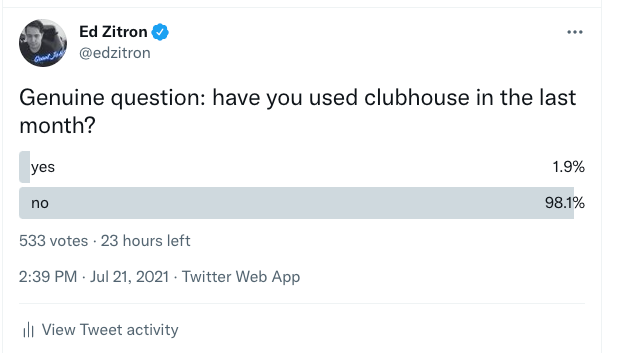Clubhouse, the voice app that lets you hear other people attempt to hold a conversation, is no longer invite-only, which one would imagine would have given the app a boost in downloads but has left it sitting at 930 in all free apps. People are debating whether Clubhouse’s initial success came as a result of the pandemic, but very few people seem to be saying what appears quite obvious to me - that nobody appears to be using the app. Yes, Clubhouse’s vanity metrics say that people are creating “500,000 rooms a day,” and they’ve launched a DM feature, but seriously - I am asking you, dear reader, do you know a single soul who has spent more than a few minutes on Clubhouse in the last 3 months? If you do, do they spend regular time on the app?
Opening the app today, it’s the same bewildering experience as before - Bitcoin psychos, LinkedIn hustle culture freaks and, ironically, a room called “Looking for Authentic and Genuine People on Clubhouse.” Another room “is the modern women over masculine or are men just SOFT ??” (punctuation theirs), and another promises to “MANIFEST Your Dream Car” from what appears to be a straight-up con artist:

The classic argument for Clubhouse’s success is that at one point Twitter was also a relatively unguided series of events that you tried to insert yourself into. This logic makes sense right up until you think about how Twitter works, and how much effort one has to put into Twitter to actually use it - you can do other things while using Twitter, you can pop in and out and not feel like you’re totally disconnected from the process, and, despite their best efforts, Twitter kind of works as a means of connecting to people.
Clubhouse on the other hand remains one of the most chaotically shitty apps I’ve ever used, and is still trying to sell a solution in search of a problem - live voice. As I wrote back in April, Clubhouse as a form of media requires a lot from the audience that does match with live voice:
Live entertainment needs to be really good to attract an audience long-term. Live video is interesting because there are lots of ways to keep people engaged. Podcasts have succeeded because, yes, it is interesting to hear people talk about stuff you’re interested in, but it’s much harder to make the case for people having to carve time out of their day to hear that - the content just needs to be so good, so reliably that it retains an audience that tells people that they must also carve out the time.
Clubhouse as a medium starts from a losing position - live anything needs to be great to attract people, and live audio is extremely difficult to do right, even with excellent production (which most Clubhouse users lack). Even with the greatest chemistry in the world, and the best production, and the best subject matter, it is a dissonant experience to enter a conversation halfway through, which “Clubhouse: Drop-in Audio” quite literally sells itself on. Drop-in audio as a product is not something that is pleasant, nor natural, nor particularly rewarding - you may chance upon a good conversation, but the likelihood for most users is that they will drop in on someone saying “well…um…so…ya know…” and drop out.
Successful apps need to attract new users, but more than anything they need to retain the ones they have, which is not what Clubhouse is doing:
The problem with any kind of network like Clubhouse is that if you aren’t retaining users, you are definitely not retaining quality users, and those users are the ones you rely upon to create rooms and attract people to your app. Live audio is tough to produce, tough to attract people to, tough to retain listeners to, and tough to keep interesting, and Clubhouse is outsourcing that to their most dedicated users - who are, it seems, somewhere between a snake oil salesman and Bitcoin maximalists. The more insular and bizarre the content creation engine is, the more unlikely it is to appeal to a wide swath of people, which makes it hard to attract creators who will do more interesting things with the platform.
This problem also makes attracting good creators to the platform difficult. If they know there aren’t many of their fans on their already, and that their fans can already watch or listen to them somewhere else, why would they bother? If the audience is somewhere between caustic and concussed, is that really the type of listener they want or need? Furthermore, even if you somehow convince them to do it, they now need to build up a following on an entirely new social network, which is incredibly difficult even with a huge following.
It also doesn’t help that Twitter Spaces does basically everything Clubhouse does without the need to get people to move networks. The Clubhouse product is not remotely hard to copy, mostly because it’s totally lacking in differentiation - what does Clubhouse do that is particularly unique, or better than anyone else? We’re past the point that a new social network is considered a novelty - a new thing to log into and use is now a burden, because people already have put vast amounts of time, energy and content into others.
It is thus very weird to me that nobody is talking about the slow-motion car crash of Clubhouse, especially considering only a few months ago it was allegedly worth $4 billion. The emperor is walking around with all of his wacky mysteries jumbling in the air, but nobody wants to admit that there is a good chance that north of $100 million has been funneled into an app that can’t seem to keep users, or create a product that’s remotely unique. The “but it took years for Twitter to find its product-market fit!” defense makes no sense, partly because Twitter launched in 2006, partly because there was nothing really like Twitter at that point - there are tons of things like Clubhouse, and all of them are better.
The “why everyone is talking about Clubhouse” articles may seem like (and very much be) clickbait, their popularity also likely points to the fact that nobody can justify Clubhouse’s existence. As I mentioned, social networks usually justify themselves at a minimum by giving users a body of work - a record of the stuff they’ve done - and the ability to share content, neither of which Clubhouse offers. Even if Clubhouse did offer these, they would be allowing people to listen to and share pre-recorded conversations - otherwise known as podcasts, but in a significantly more annoying form factor.
I feel like nobody actually thought about it while they went on about how big Clubhouse would be. Whenever I receive a voice note, I feel revolted - what’re you doing? Why do I have to listen to this? Why not email me? Now I have to put my damn phone to my ear and listen. Trying to make me do that with a conversation that might be important but probably isn’t is a terrible offer.
Clubhouse is the elephant in the room in venture, and I believe there is a conscious attempt to not discuss it for fear that it proves that the entire conversation around it was hot air. When everyone desperately rushed to say that it was the next big thing, I asked repeatedly what exactly about it was going to be big, or change things. The answer mostly came down to the idea that we don’t know what the future looks like, and that people were on the waitlist - which is no longer an excuse.
Nick Bilton at Vanity Fair was a rare case of dissent, making a clear warning that this was very much a pandemic app and nothing more - but many people in venture and tech do not seem to want to discuss it as anything other than “a big social network.” The Information questioned whether Clubhouse was the next Foursquare - a promising company with tons of press that ultimately didn’t reach the giddy heights it was “meant to” - but for the most part, people have remained either indifferent or positive about it.
The fact this isn’t regularly discussed is both a bad sign for the app and also a sign, in my opinion, of an industry-wide embarrassment. So many people rushed to join Clubhouse, or discuss what’s big on Clubhouse, or how Clubhouse was the beginning of a “social audio revolution” because they were afraid they’d miss out on the next TikTok, and I’d argue that the press did a woeful job at actually questioning the format. It feels as if there was an unquestioning conflation between an app being important and an app raising a bunch of money, and though one can say that the simple act of raising makes something important, it’s irresponsible and embarrassing to run a single article on Clubhouse without questioning the format itself.
I give it maybe another two months before people start writing post mortems for the company. Whatever means they use to monetize will likely involve radio-style commercials without the quality or attraction of radio, or some sort of Clubhouse+ so that people who promise to manifest you a new car can moderate out people who say “how?”
The only way that Clubhouse could become as meaningful and valuable as people claim it to be would be to funnel tens of millions of dollars into content every single month, covering every foreseeable geography and demographic with drop-in audio channels, and then try and get Clubhouse installed in as many places as possible so that people would pay for it.
At that point, Clubhouse has become Internet Radio, a concept that already exists. To give you some context, the entire radio industry made just under $10 billion in 2020, down from $12.8 billion the year before.
It’s time for everybody to admit what was already obvious - Clubhouse is not a valuable company, it’s not the future of social media, and it’s certainly not worth billions of dollars. It should be an industry-wide embarrassment that so many people fell for this company’s bullshit - but people are so scared of being behind on the times that they will blindly follow and celebrate some utterly stupid things.
To conclude, I ran a short poll while writing this column - asking people if they’d used Clubhouse in the last month. Of 533 votes, 1.9% said they had, and 98.1% said they had not.

Probably not a good sign.

